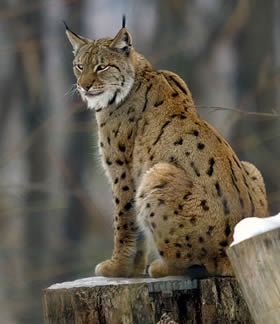 By Annabel Cook, Communications & Fundraising Manager
By Annabel Cook, Communications & Fundraising Manager
There is no denying that the Eurasian lynx (Lynx lynx) is a stunning animal, easily recognised by its bobbed tail and tufted ears. It is found across much of Europe, where is it is one of the largest predators, along with wolves and bears. It is thought that lynx have been extinct in the UK for over 1,000 years – probably due to hunting for its fur and loss of habitat as farming became more intensive.
Proposed reintroduction
There has been a proposal by the Lynx UK Trust for a trial reintroduction and several potential sites across the UK have been identified. If a trial does go ahead, it’s possible that more than one site will be selected.
Several reasons have been put forward for a reintroduction. These can be summarised as providing local ecological benefits, for example, acting as a natural control against deer, helping counteract some of the damage they do to our forests. It has also been suggested that a reintroduction would bring economic benefits to release areas, such as through increased tourism.
The GWCT’s opinion
In October 2015, an informal consultation was launched with a number of stakeholders asked to provide feedback, including the GWCT.
We are generally cautious about the proposal, given the challenges of fulfilling the requirements of the IUCN’s “Guidelines for Reintroductions and Other Conservation Translocations”.
We feel that limited information has been provided, and we would want to explore further the potential effects on existing conservation projects; the conservation of other species; and on existing land use, which often directly and indirectly supports habitat and species conservation.
In addition, we feel that more clarity is required on ecosystem service benefits, including social acceptability; available management options; and the methods of trialling reintroductions, including success criteria.
Ecological concerns
Our understanding of the potential prey for lynx in the UK suggests that it would be different to prey in other parts of its range, so this needs further investigation. In addition, our research suggests conservation of some UK BAP species (those identified as being the most threatened and requiring conservation action under the UK Biodiversity Action Plan) would be impeded by an increase in other predator species, that may also be supported by the scavenging the carcasses of lynx prey.
Finally, one of the reasons given for the reintroduction is to reduce grazing pressure on forests by deer. The resulting advance of forest fringe could mean other species with low numbers in the UK would lose out. For example, black grouse and grey partridge prefer an open habitat. The expansion of forestry could isolate existing populations and prevent dispersal.
Economic concerns
The project proposal suggests that a trial introduction would be of great economic benefit to the local economy. This would be due to reduced crop and forestry damage by deer, and increase in tourism and recreation around the study sites.
However, we believe that the figures given for economic benefit are too high and we have our concerns around the proposed income from tourism. Lynx are nocturnal and secretive and, together with the low densities during the trial, are unlikely to attract significant additional tourism.
Post-release monitoring
Monitoring of a trial reintroduction of a long-absent predatory species will be different to monitoring an established species. It should include, as far as possible, key species which may be affected, positively or negatively, including prey and predators. The consultation document goes into some detail on what the monitoring will focus on, but we would like to see a budget and an indication of how it will be funded.
In conclusion
We have many concerns about the proposed reintroduction, but most are based on the lack of information provided in the consultation document. For example, details of an exit strategy that guarantees the lynx can be removed.
A particular concern for GWCT is the land management community. We would like to see that species management guidance is agreed, which includes clear management criteria in terms of control of lynx impacts by land managers. Although there is a proposal for a sheep compensation scheme, which is welcomed, we would like to see more detail. This would future-proof any trial proposal.
What’s next?
The Lynx UK Trust is starting to reach out to stakeholders who responded to the consultation, to discuss their feedback, including at a stakeholder forum event earlier this month. They still intend to apply for a licence for a trial reintroduction of lynx at some point in 2016.
Have your say
We're always interested to hear what other people think so please take our short survey below: